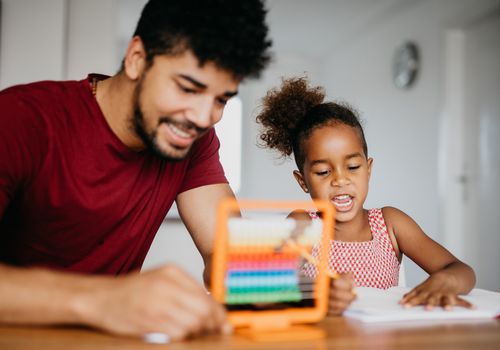In order to help a child with Dyscalculia, it is important for us to first get a diagnosis. Next try to gather as much professional support as you can. And finally learn how to support a child with dyscalculia at home.
Getting a Dyscalculia diagnosis:
First things first: Before we can access appropriate resources, we will first need to establish that your child does indeed have Dyscalculia. Many people aren’t familiar with this learning difficulty. You can read more about Dyscalculia here. Finding out if your child has dyscalculia requires an assessment. These are sometimes called psycho-educational assessments or global assessments. But both terms mean the same thing.
Parents are sometimes confused about why a full assessment is required if a child only struggles with Maths. There are three reasons for this. First, it is essential to get an overall picture of your child’s functioning as many other aspects such as spatial skills, visual discrimination and even language skills can have an impact on how your child perceives maths. Secondly a child with dyscalculia may have other underlying learning difficulties that haven’t been identified before. And lastly, in the case that concessions are needed a full psycho-educational report needs to be submitted to the Department of Education as part of the application.
A thorough assessment with include:
- Gathering background history, both from the family and from the child’s teachers.
- Conducting a full assessment.
- Clear, easy to understand verbal feedback
- A written report with the findings
How professionals can help a child with Dyscalculia
Different types of professionals can help a child with dyscalculia in different ways. Here are some of the role players you could include on your team:
- Remedial teacher
- Math tutor
- Educational psychologist
There are no medications for dyscalculia. And since it’s a little lesser known than the “reading equivalent” of this disorder – Dyslexia – fewer specialised intervention programmes are available. But for most children, focusing on two basic principles can make a big difference –
The first is to engage as many of your child’s senses while they are learning maths. Have them touch objects while counting. And manipulate shapes while learning about their maths properties. Use pizzas and sandwiches to teach fractions. Or have them “jump out” numbers during a hopscotch game. A little creativity can go a long way. Check out our Pinterest page if you’re stuck for ideas.
Secondly, remember to always build math concepts systematically. With one skill building on the next. Don’t rush to try and keep up with the class. Instead, make sure that your child has really mastered a concept before you move on. Getting an Individual Learning Plan (ILP) for your child at school will allow him to learn at his own pace. A child with Dyscalculia may also qualify for special accommodations at school. These may include things like having extra time on maths tests or being allowed to use a calculator. In severe cases, a child may be exempted from having to pass Maths in order to be promoted to the next Grade.
How You Can Help Your Child with Dyscalculia
As a parents your main role is to support and encourage your child. Remember that you are mommy first and teacher second. If a child is so distressed by Maths that it causes constant friction at home, I would recommend that you first just take a step back. Focus on your relationship first and only get back to the maths when you are both in a good space.
However, if your child is motivated and ready to learn here are some strategies you can use at home:
- Remember to always engage his senses!
- Using graph paper will help to keep numbers lined up so that he makes fewer place value errors
- Use an blank piece of paper to cover up other items on a worksheet so your child can focus on one problem at a time.
- Board games like Snakes & Ladders and Monopoly are great for teaching Maths skills in a fun way
Lastly, advocate for your child at school and connect with other parents whose children have similar difficulties so you can swap out ideas.
For more information contact Anel on 082 695 9319 or email anel@childpsych.co.za

